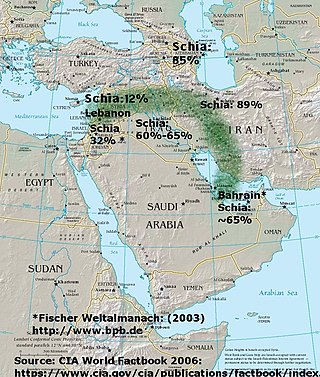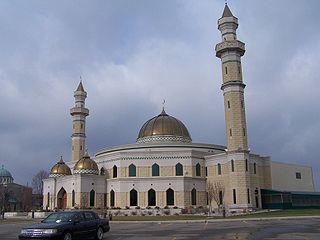
The United Arab Emirates (UAE), or simply the Emirates, is a country in West Asia, in the Middle East, at the eastern end of the Arabian Peninsula. It is a federal elective monarchy made up of seven emirates, with Abu Dhabi serving as its capital. It shares land borders with Oman to the east and northeast, and with Saudi Arabia to the southwest; as well as maritime borders in the Persian Gulf with Qatar and Iran, and with Oman in the Gulf of Oman. As of 2024, the UAE has an estimated population of over 10 million, of which 11% are Emiratis; Dubai is its most populous city and is an international hub. Islam is the official religion and Arabic is the official language, while English is the most spoken language and the language of business.

Islam is the official religion of the United Arab Emirates. Of the total population, 76.9% are Muslims as of a 2010 estimate by the Pew Research Center. Although no official statistics are available for the breakdown between Sunni and Shia Muslims among noncitizen residents, media estimates suggest less than 20 percent of the noncitizen Muslim population are Shia.
Human rights in the United Arab Emirates (UAE) are substantially restricted. The UAE does not have democratically elected institutions and citizens do not have the right to change their government or form political parties. Activists and academics who criticize the government are detained and imprisoned, and their families are often harassed by the state security apparatus. There are reports of forced disappearances of foreign nationals and Emirati citizens, who have been abducted, detained and tortured in undisclosed locations, and denied the right to a speedy trial and access to counsel during investigations by the UAE government. Human Rights Watch states that Emirati laws maintain capital punishment and discriminate against women, migrants and LGBT individuals.

The Catholic Church in the United Arab Emirates is part of the worldwide Catholic Church, under the spiritual leadership of the Pope in Rome.

The dynamic between the League of Arab States and the Islamic Republic of Iran has been ambivalent, owing to the latter's varying bilateral conduct with each country of the former. Iran is located on the easternmost frontier of the Arab League, which consists of 22 Arab countries and spans the bulk of the Middle East and North Africa, of which Iran is also a part. The Arab League's population is dominated by ethnic Arabs, whereas Iran's population is dominated by ethnic Persians; and while both sides have Islam as a common religion, their sects differ, with Sunnis constituting the majority in the Arab League and Shias constituting the majority in Iran. Since Iran's Islamic Revolution in 1979, the country's Shia theocracy has attempted to assert itself as the legitimate religious and political leadership of all Muslims, contesting a status that has generally been understood as belonging to Sunni-majority Saudi Arabia, where the cities of Mecca and Medina are located. This animosity, manifested in the Iran–Saudi Arabia proxy conflict, has greatly exacerbated the Shia–Sunni divide throughout the Muslim world.

The Shia Crescent is the notionally crescent-shaped region of the Middle East where the majority population is Shia or where there is a strong Shia minority in the population.
Islam is divided into two major sects, Sunni and Shia Islam, each with its own sub-sects. Large numbers of Shia Arab Muslims live in some Arab countries including Lebanon, Yemen, Bahrain, Iraq, Saudi Arabia, Kuwait, Oman, the UAE, and Qatar.

After the death of Muhammadin 632, the Muslim world split into two camps, the Sunnis, who believed that the caliphs of the Islamic community should be chosen by consensus, and a second group, the Shia who believed that Mohammed's successors should be members of his own family, beginning with Ali ibn Abi Talib, his cousin and son-in-law.
The population of Dubai, the most populous city in the United Arab Emirates, is estimated to be 3.5 million as of April 2022 according to government data. As of 2021, 3.2 million were non-Emirati, and 69% were male. About 58.50% of the population is concentrated in the 25-44 age group. This unnatural age and gender distribution is due to the large proportion of foreign workers, most of whom are working-age males. Life expectancy at birth was 81 years for males, and 82.1 for females.
The Constitution of the United Arab Emirates provides for freedom of religion by established customs, and the government generally respects this right in practice; however, there are some restrictions. The federal Constitution declares that Islam is the official religion of the country. The Government confirmed it illegal to convert from Islam and leaving the Islamic faith is considered apostasy, a crime punishable by death.

The Emiratis are the citizen population of the United Arab Emirates. Within the UAE itself, their number is approximately 1.15 million.
Shia Islam in Africa is the continent's second most widely professed sect of Islam behind Sunni Islam.
The Saudi government does not conduct a census on religion or ethnicity, but some sources estimate the Shia population in Saudi Arabia to make up around 10-15% of the approximately 34 million natives of Saudi Arabia.
Emirati Iranians or Emirati Persians are residents of the United Arab Emirates of Iranian national background. The community accounts for 5-8% of the country's population and is highly respected for its contributions to the social and economic fabric of the UAE.
Islam is the majority and official religion in the United Arab Emirates, professed by 74.5% of the population as of 2020. 63.3% are Sunni, 6.7% are Shia, while 4.4% follow another branch of Islam. The Al Nahyan and Al Maktoum ruling families adhere to the Maliki school of jurisprudence. Many followers of the Hanbali school are found in Sharjah, Umm al-Quwain, Ras al-Khaimah and Ajman. Their followers include the Al Qasimi ruling family. The other main religions present in the country include Christianity (12.9%), Hinduism (6.2%), and Buddhism (3.2%). Zoroastrians, Druze, Baha'i, Judaism, and Sikhism are also practiced by some non-nationals. 1.3% of the population is agnostic.
Expatriates in the United Arab Emirates represent about 88% of the population, while Emiratis constitute roughly 12% of the total population, making the UAE home to the world's highest percentage of expatriates after the Vatican City.

Islam in Lebanon has a long and continuous history. According to an estimate by the CIA, it is followed by 69.3% of the country's total population, up from about 30% of population in 1950s. Sunnis make up 31.9%, Twelver Shia make up 32%, next to smaller percentages of other Shia branches, such as Alawites and Ismailis. The Druze community is designated as one of the five Lebanese Muslim communities, even though most Druze do not identify as Muslims, and they do not accept the five pillars of Islam.

The Iranian Mosque Hosainia is a Twelver Shia hosainia located near the old Textile Souk in the Bur Dubai district of Dubai, United Arab Emirates. Built in 1979, the mosque is also known as Ali Ibn Abi Talib Mosque, in honor of Ali Ibn Abi Talib, the central figure of Shiism.

A 2009 survey by the Pew Research Center estimated that 10-13% of Muslims worldwide adhere to Shia Islam, with a global total of between 154 million and 200 million Shia Muslims. In the Americas, Pew estimated a population of just under 4.6 million Muslims overall in 2009, with a small portion of those being Shia.

Iran and Saudi Arabia are engaged in a proxy conflict over influence in the Middle East and other regions of the Muslim world. The two countries have provided varying degrees of support to opposing sides in nearby conflicts, including the civil wars in Syria and Yemen; and disputes in Bahrain, Lebanon, Qatar, and Iraq. The struggle also extends to disputes or broader competition in other countries globally including in West, North and East Africa, South, Central, Southeast Asia, the Balkans, and the Caucasus.











